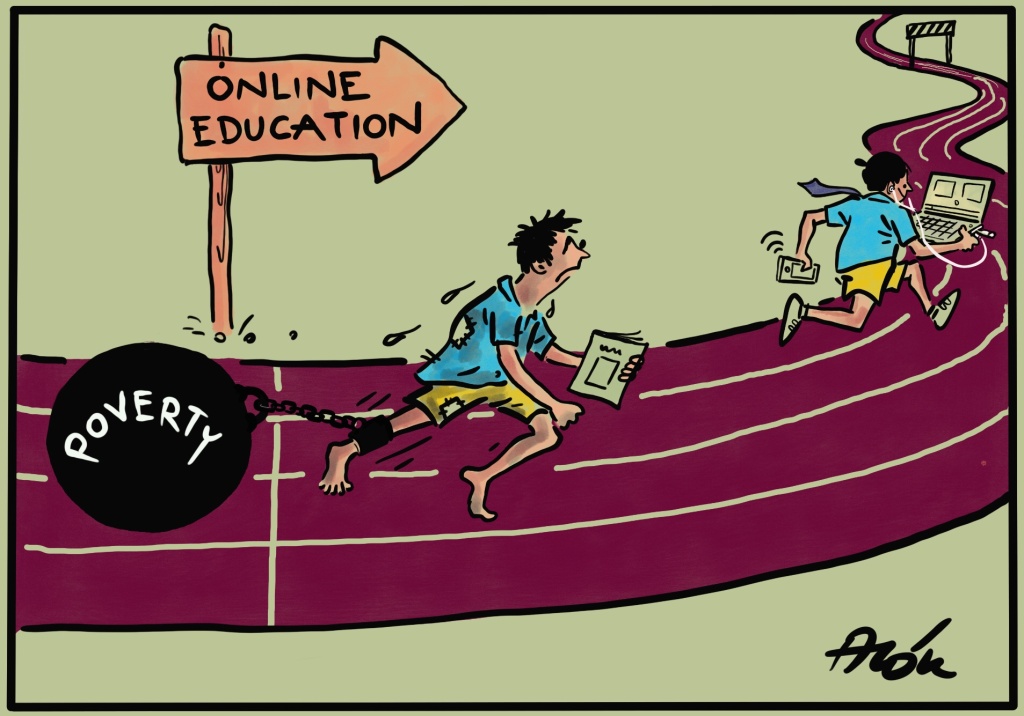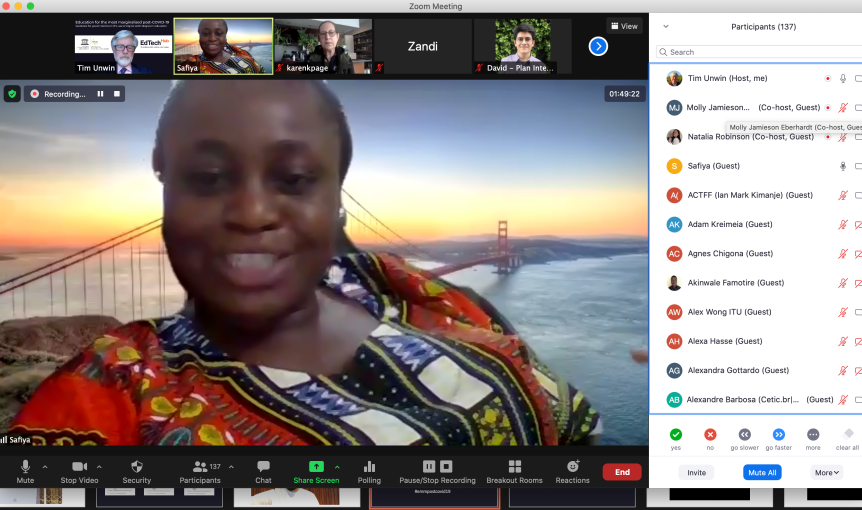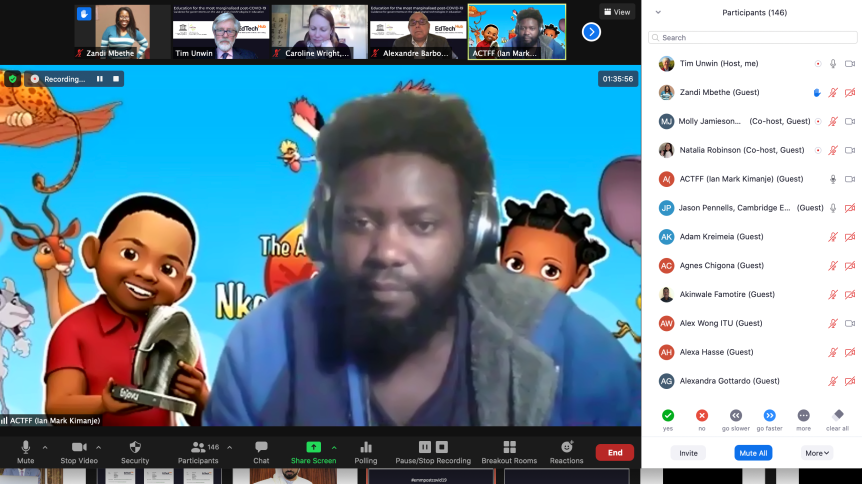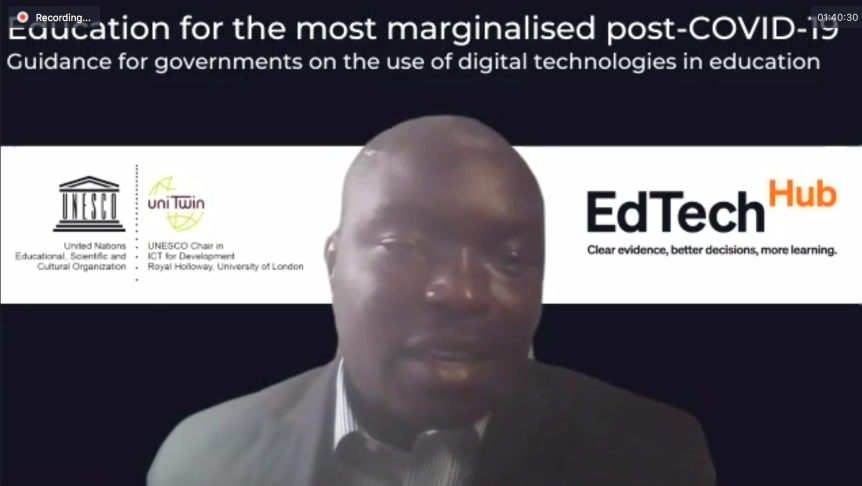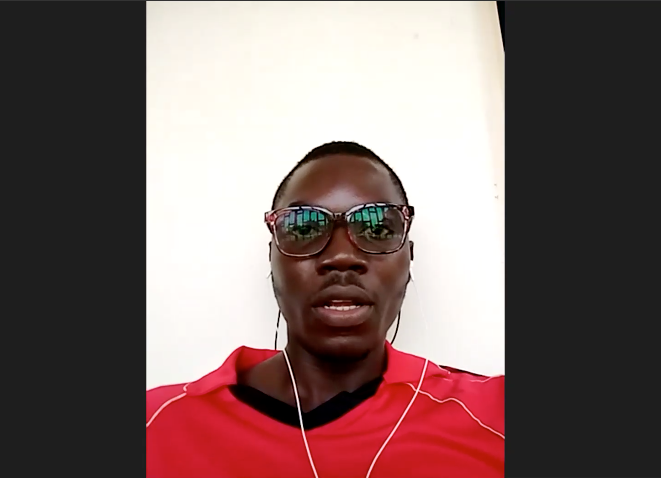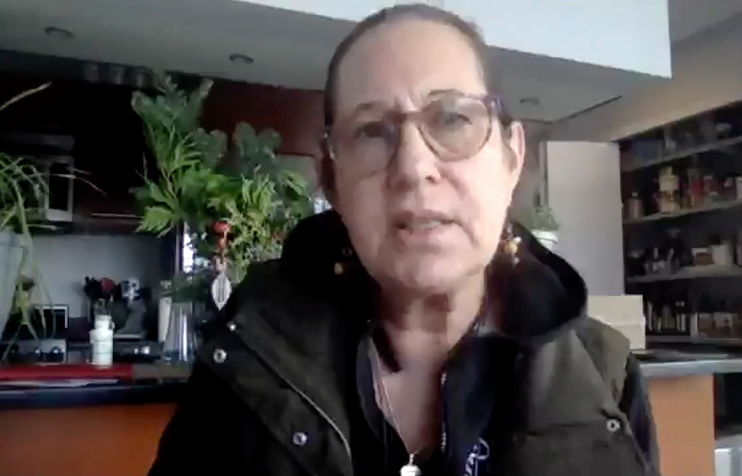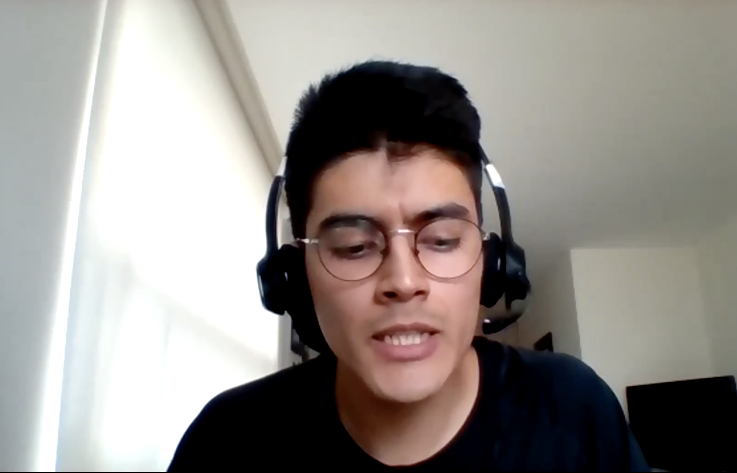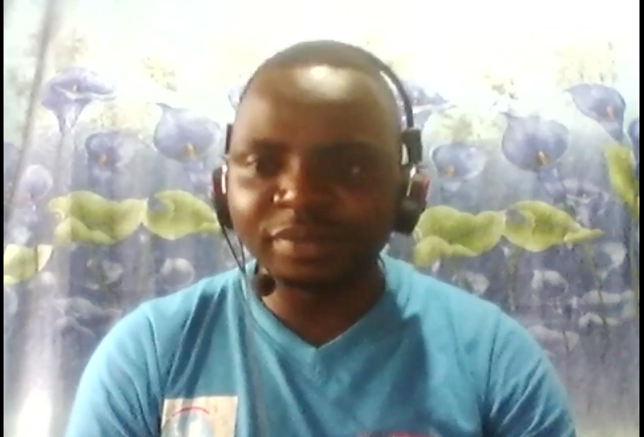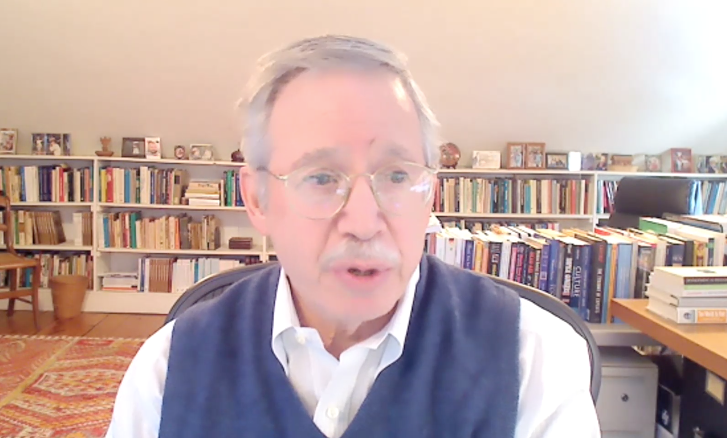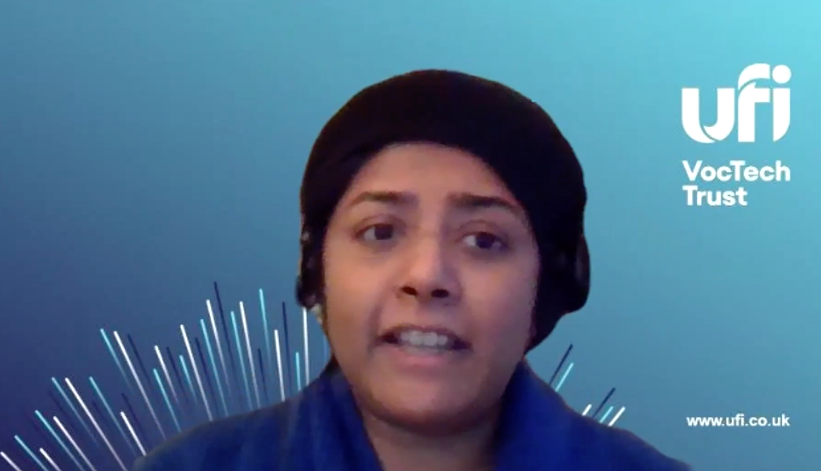The Report on Education for the Most Marginalised post-COVID-19: Guidance for governments on the use of digital technologies in education, led by the UNESCO Chair in ICT4D and funded by the FCDO and World Bank through the EdTech Hub was officially launched in a 2 hour online gathering on 18th December 2020. More than 350 people had registered for the launch, with some 150 participating at any one time throughout the event. Materials from the launch are available below (further videos and other resources will be available here shortly, so do revisit) and full information about the report is available here:
Opening and Welcome
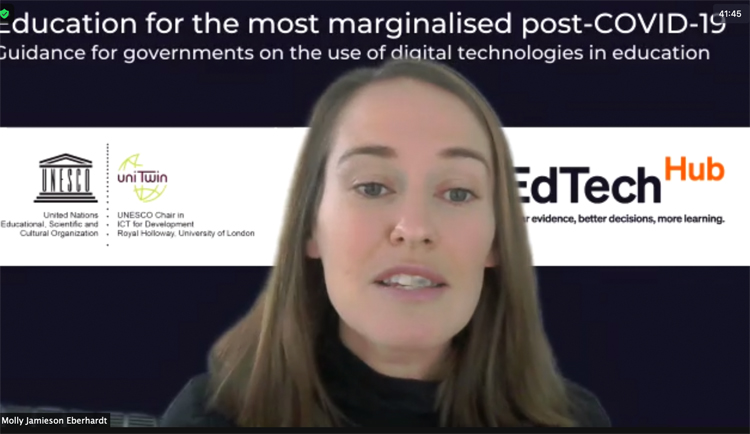
Opening
Molly Jamieson Eberhardt (Program Director R4D, and Director EdTech Hub)
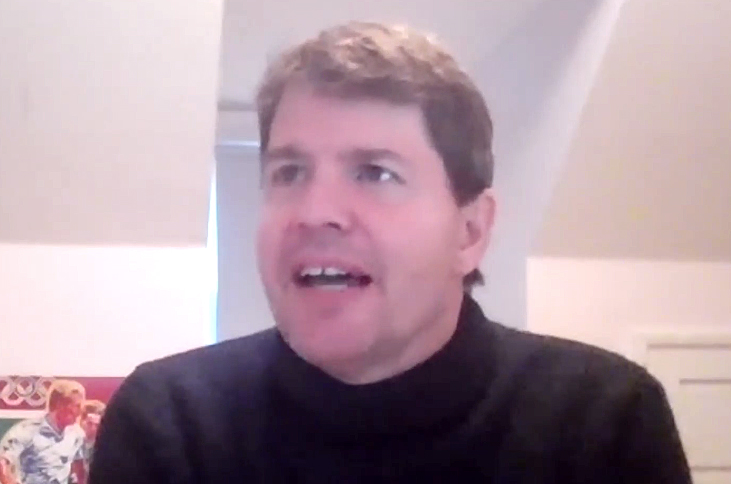
Welcome
Michael Trucano (Global Lead for Innovation in Education and Senior Education and Technology Policy Specialist, World Bank) (video here)
“Our focus needs to be clear on whom we are helping and how. So this is not an easy question; it’s not a simple question to answer. In the end it’s not about technology it’s about people, it’s about political will, it’s about what we prioritise.”
Introduction to the report
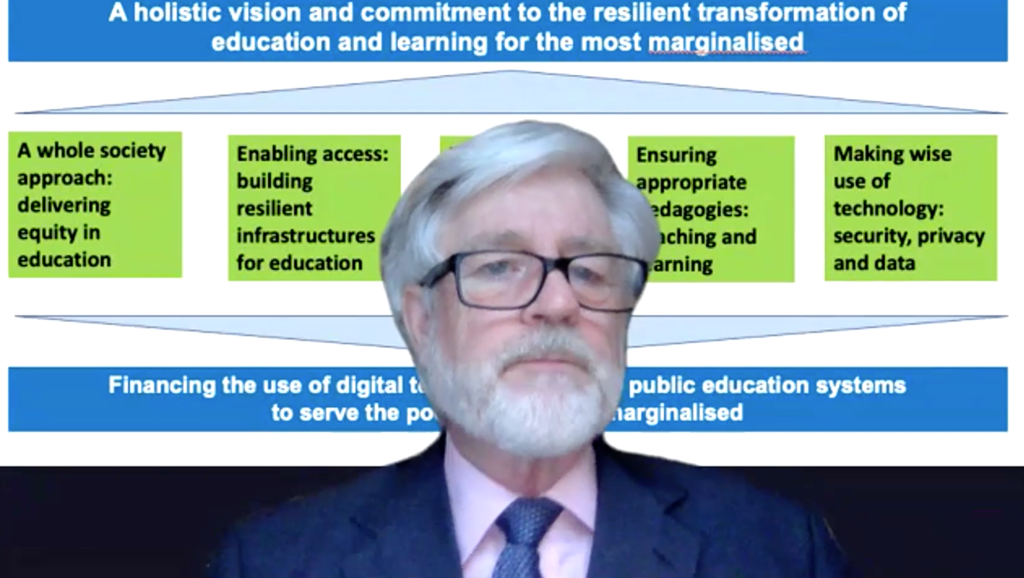
Introduction to the report: Tim Unwin (Chairholder, UNESCO Chair in ICT4D and Co-Founder of TEQtogether) (video here)
High-level panel
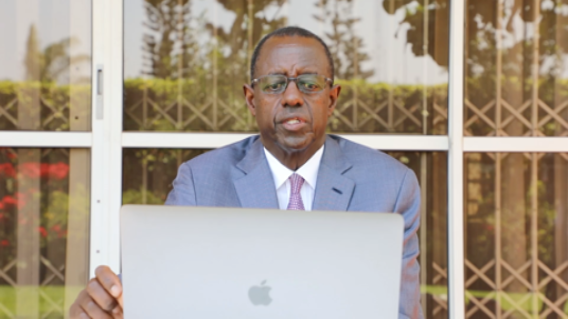
John Nasasira (Head of Expert National Task Force on Fourth Industrial Revolution, former Government Chief Whip 2011-2013, and Minister of Information and Communication Technology 2013-2016, Uganda) (by video)
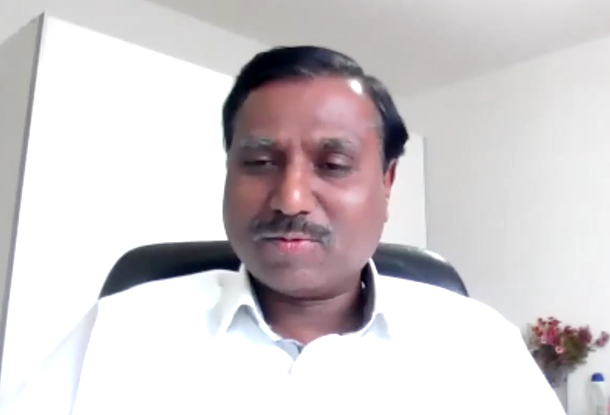
Srinivas Reddy (Branch Chief, Skills and Employability, ILO) (video here)
“This is one of the most outstanding pieces! When I saw the First Draft I thought ‘Wow this is different – this is action oriented – we can use this'”.
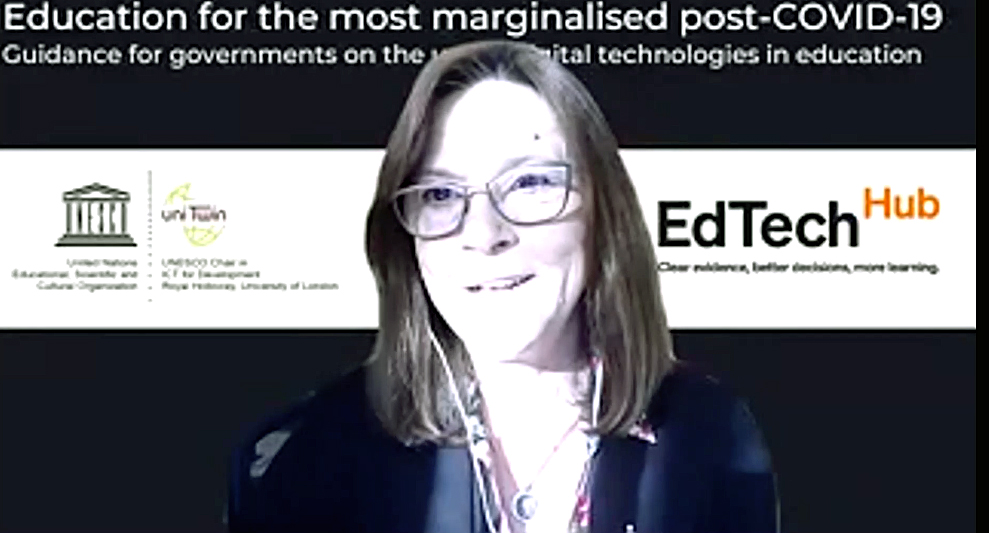
Janet Longmore (Founder and CEO, Digital Opportunity Trust) (video here)
“When we are looking at breaking down education and engaging young people so they feel empowered in the design of their education, let’s think differently about how we can engage coaches, mentors, facilitators and teachers so that young people have that opportunity to relate.”
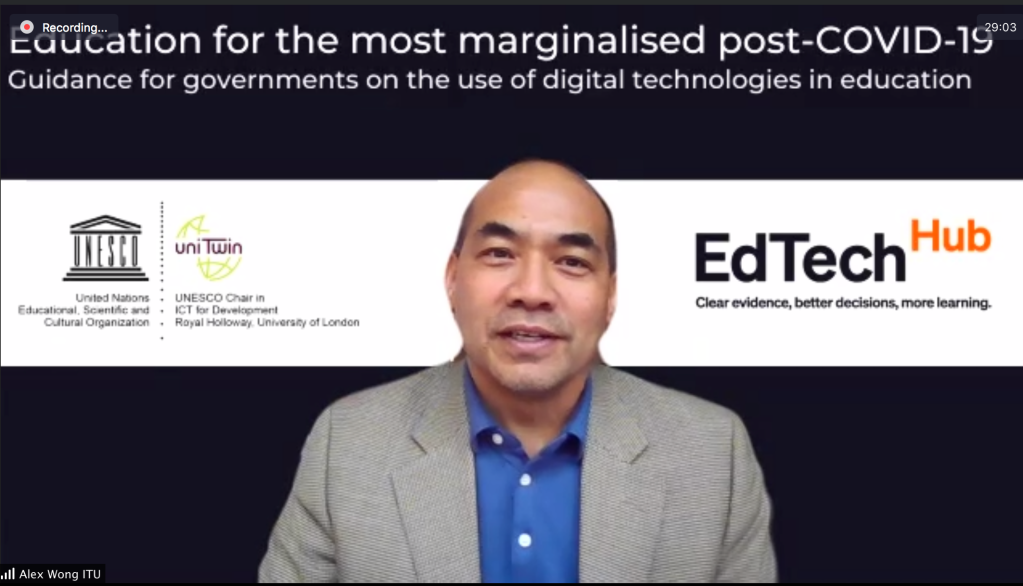
Alex Wong (Senior Strategy Advisor, Telecommunication Development Bureau, ITU) (video here)
“I love the guidance notes because they really take a particular issue, something very readable and it’s a great opportunity to use that as dialogue with a country as we progress our work.”
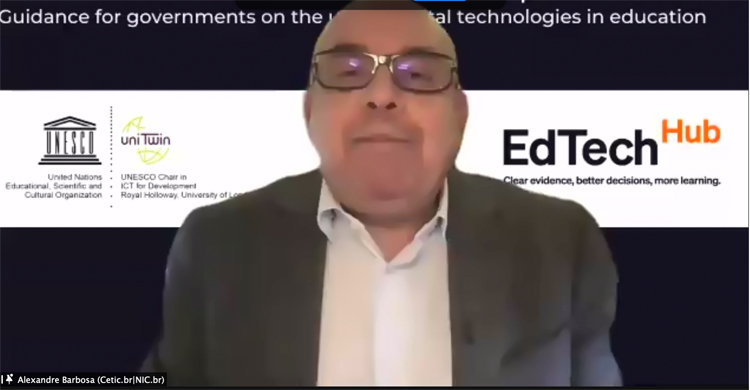
Alexandre Barbosa (Gerente do Cetic.br) – Speech (in .pdf) (video here)
“The content of the report provides concrete recommendations to governments in light of the Covid-19 pandemic, highlighting the role of digital technologies as strategic components in delivering better quality and more resilient education.”
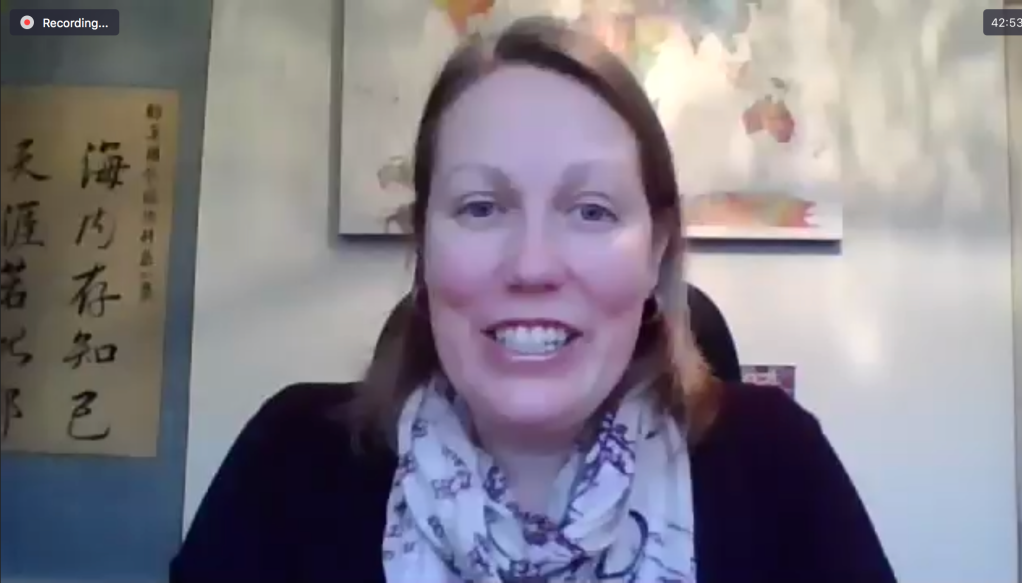
Caroline Wright (Director General, British Education Suppliers Association) (video here)
“Technology and Education for the Most Marginalised Post-COVID-19 provides pragmatic, practical and insightful strategies, solutions and supportive practices to help and support Governments and educationalists working to empower learners in the most challenging of circumstances“.
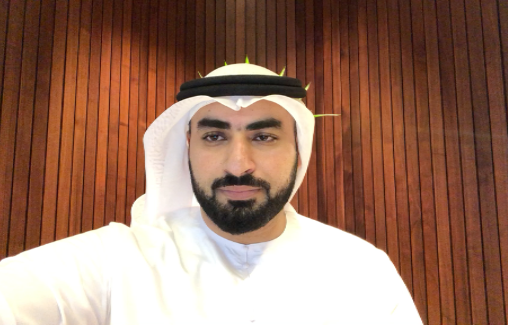
Waleed Al Ali (General Co-ordinator Digital School Initiative, Mohammed Bin Rashid Global Initiatives, UAE) (by video)
Video reflections
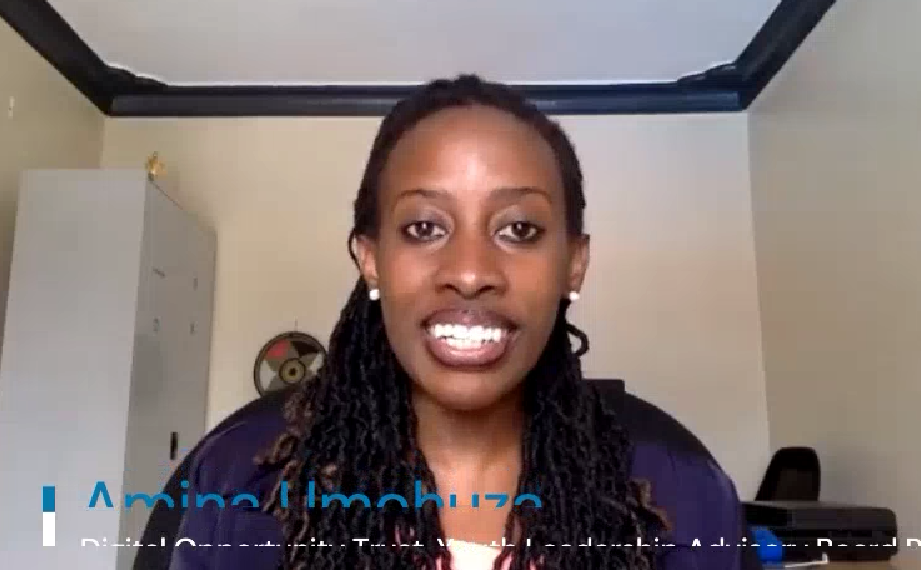
Amina Umohoza (Digital Opportunity Trust, Youth Leadership Advisory Board, Rwanda; CEO of Saye Company and the Founder of Dukataze). (Access video here).
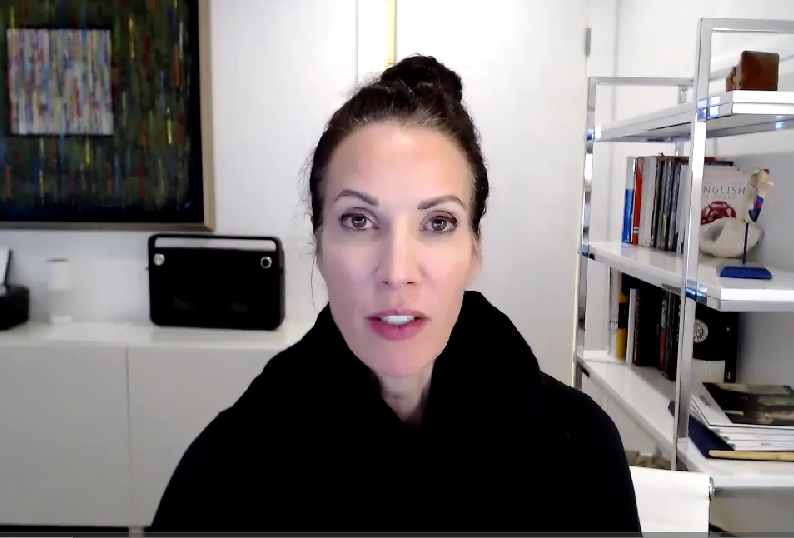
Helen Crompton (Associate Professor Teaching and Learning, Old Dominion University). (Access video here).
Insights on the report’s Guidance Notes:
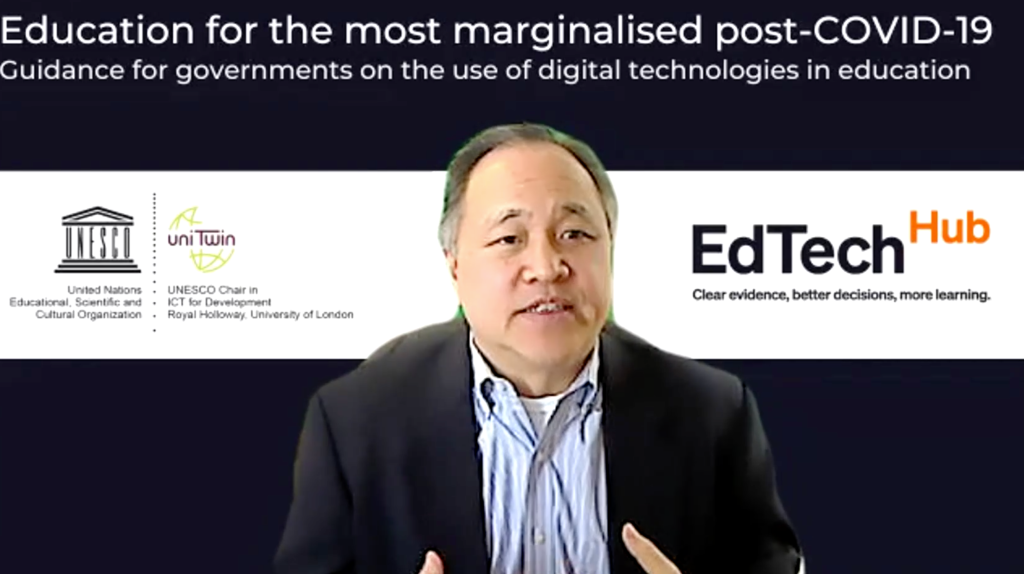
Ensuring resilient connectivity: Christopher Yoo (John H. Chestnut Professor of Law, Communication, and Computer and Information Science at the University of Pennsylvania Law School, and the founding director of the Center for Technology, Innovation, and Competition) (video here). Guidance note was prepared with the support of Leon Gwaka and Müge Haseki.
“What does connectivity mean? For places that do not have internet connectivity we have to look at other means of communication that may already be established … Many people are looking for a single magic technology to unlock all the problems – and the reality is there isn’t one.“
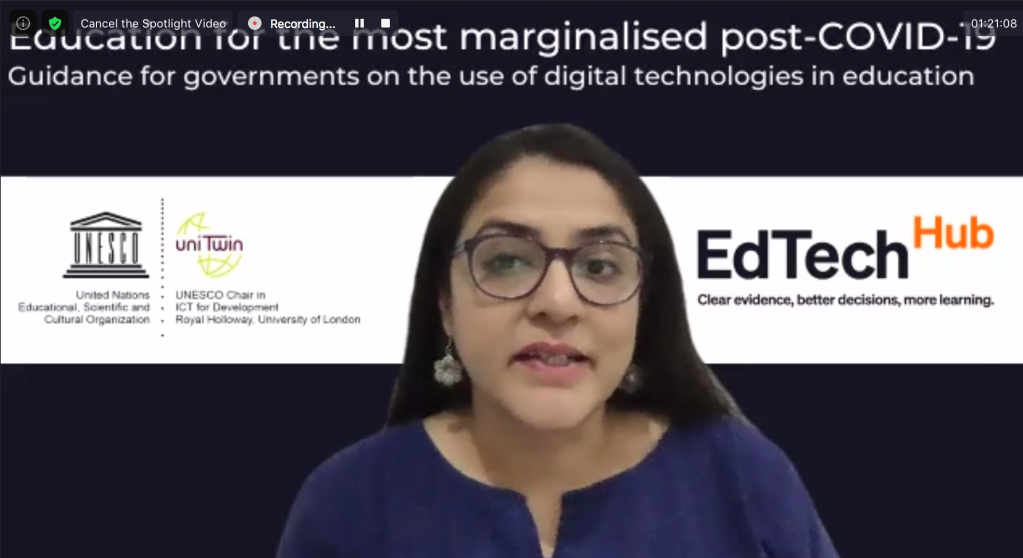
Keeping Safe and Local Context: Azra Naseem (Director, Blended and Digital Learning, Aga Khan University, Pakistan) (video here)
“There is no such thing as one size fits all, and the years of de-contextualised development and uses of digital technologies in education have really created a big gap and lots of problems during this lockdown period.”
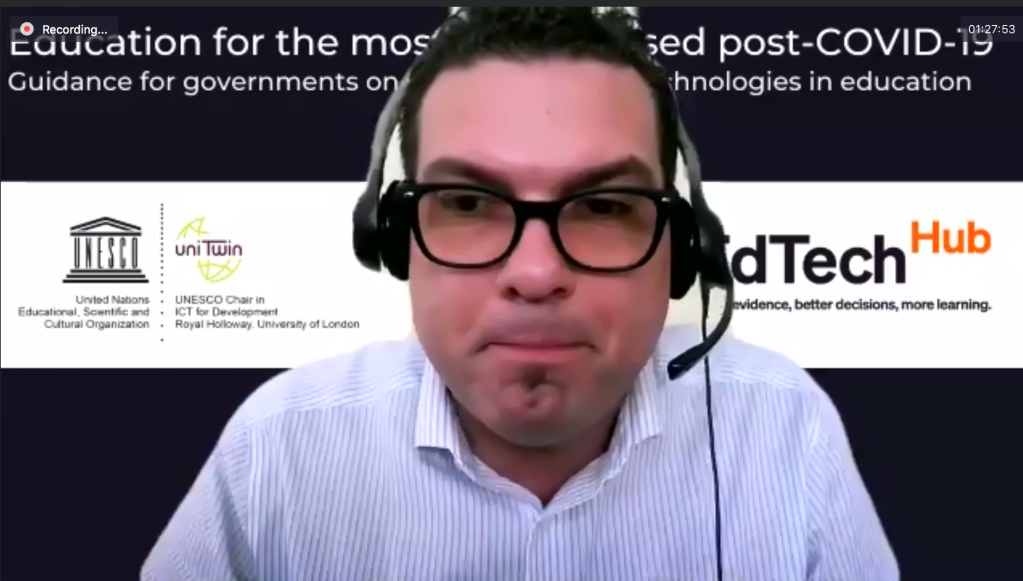
Small Island States and the importance of sustainable electricity: Javier Rua (former Director of Public Policy for Sunrun; former Chairman, Puerto Rico Telecommunications Regulatory Board) (see also slide deck) (video here)
“One thing that is clear is that connectivity and telecoms in islands of the Caribbean failed [during the hurricane] not because transmitters fell down (some of them did), but it had to do in many ways with lack of power. If you have no power in your house you cannot power your device- like a tablet with 4G connection or a radio.”
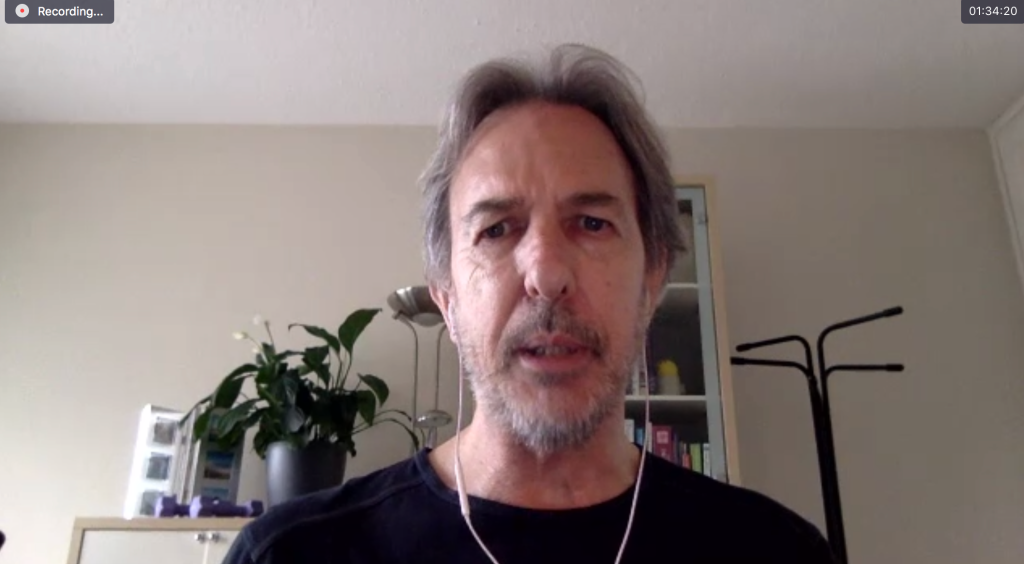
The importance of OER and Creative Commons: Paul West (Senior Education Adviser, West and Associates; and South Africa Chapter Lead, Creative Commons) (video here)
“Everything we have heard here today depends on free educational materials for everybody. We should be able to share it, modify it, do what we need to do to it without worrying about copyright issues.”
In translation
We were delighted to announce the following translations of the report’s Executive Summary during the launch:
- بالعربيةا : لملخّص التنفيذيّ (Translation by The Digital School Initiative, Mohammed bin Rashid Al Maktoum Global Initiatives)
- En français: Résumé exécutif (Translation by Karen Ferreira-Meyers)
- Em português: Resumo executivo (Translation arranged by Cetic.br)
- En español: Resumen Ejecutivo (Translation arranged by Cetic.br)
The full report has also been translated into French as Éduquer les personnes les plus défavorisées après la COVID-19: orientations destinées aux gouvernements sur l’utilisation des technologies numériques by Karen Ferreira-Meyers:

Karen Ferreira-Meyers on translating the report into French (Video in English and French)
Thanks to all those who participated
Sadly, there were far too many people to capture on a single slide, but we hope this image captures something of the character of the launch:
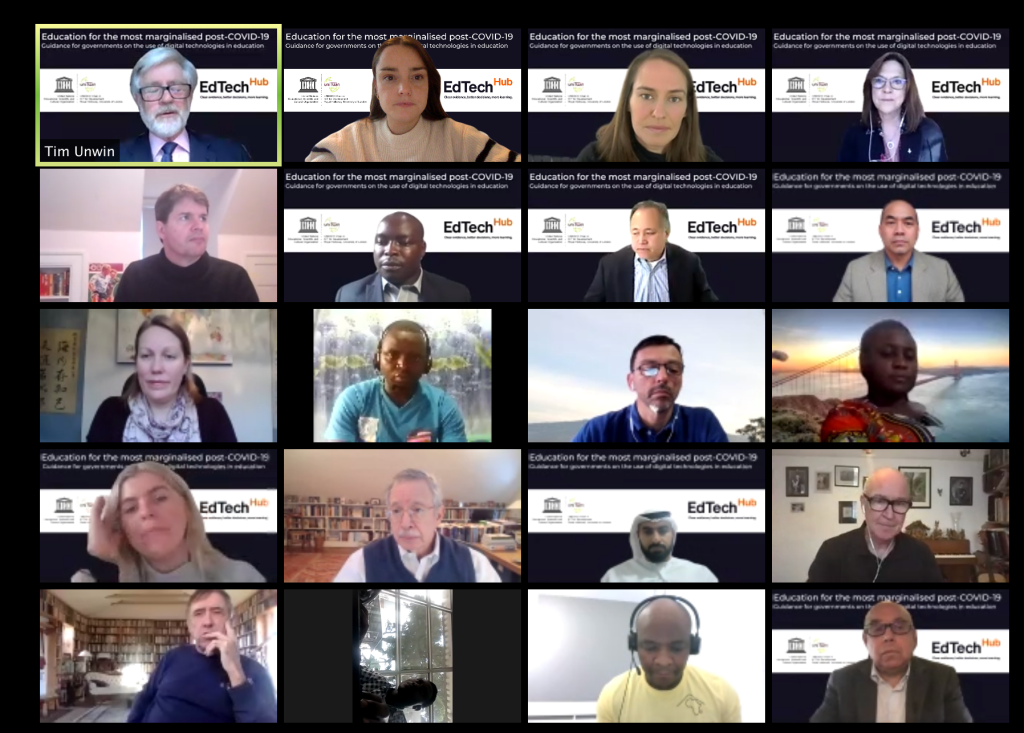
And we are very grateful to all those who commented and asked questions
Some of those who contributed to the lively discussions are featured below – do click through the gallery to meet them:
We thank everyone who joined us for this launch and look forward to working with you in the future as we all ACT together to ensure equity in education through the use of appropriate and relevant digital technologies.
Some concluding comments about the report…
Regardless of where you are located in the world, this new Education for the Most Marginalized Post-COVID-19 report is essential reading. It provides comprehensive and concise guidance for educational leaders through the lens of equity. CoSN, the N. American NGO for education technology leaders is proud to have been a collaborator in this excellent resource
Keith Krueger, CEO, CoSN – Consortium for School Networking, Washington, DC
Technology and Education for the Most Marginalised Post-COVID-19 provides pragmatic, practical and insightful strategies, solutions and supportive practices to help and support Governments and educationalists working to empower learners in the most challenging of circumstances. I congratulate Professor Unwin and his team on the publication of this vital report, and for bringing together academia, industry, civil society and Government officials from around the world in the common-purpose of sharing knowledge and good practices for the collective intention of improving educational outcomes and experiences for those students in the most disadvantaged communities.
Caroline Wright, Director General, BESA
And thanks to Alok
We are most grateful to the Indian cartoonist Alok (@caricatured) for granting us permission to use his cartoon for the report. It captures so well the essence of contemporary online learning that this report is seeking to change.
